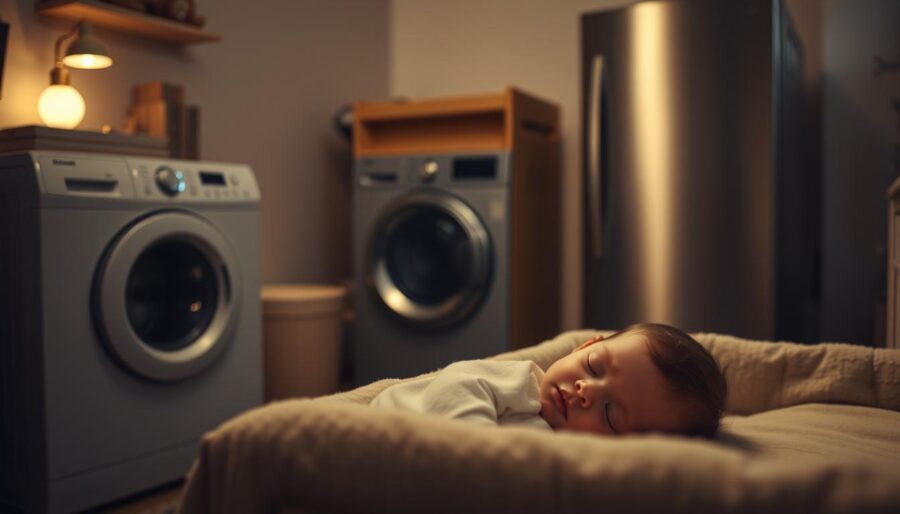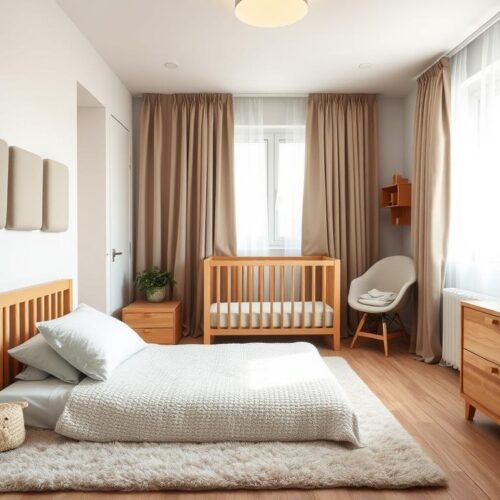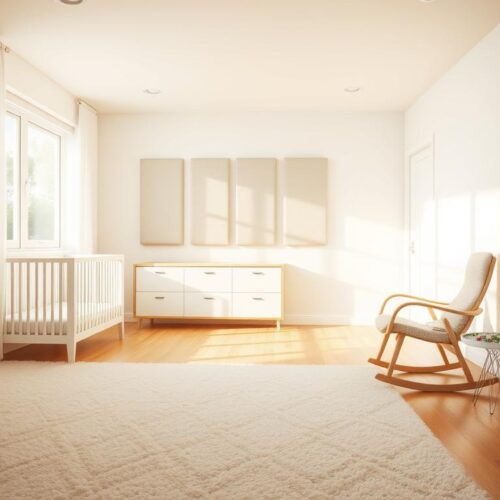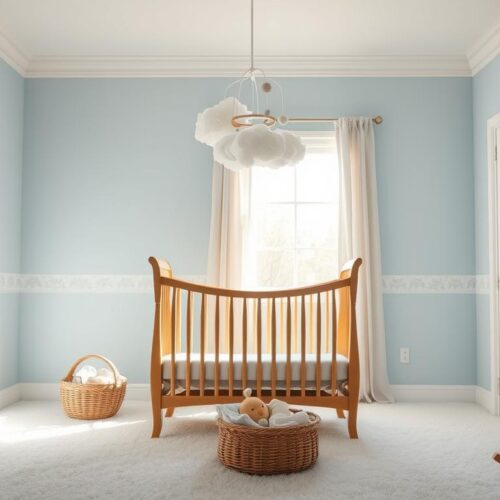Ensuring your baby sleeps well is very important to you as a parent. But, you might not think about how noises from appliances impact their sleep. Many household appliances make sounds that can disturb your baby’s rest. It’s key to know how these noises can interrupt their sleep.
Understanding the link between appliance noise and sleep is vital. It helps in making a peaceful space for your baby. A quiet environment is essential for their growth and health.
The Impact of Appliance Noise on Baby Sleep
Appliance noise can really mess with how well a baby sleeps. It’s important to know how these sounds affect sleep. Research has found that loud noises from home appliances can wake babies up. This makes it tough for them to get back to sleep.
Experts, like those from the American Academy of Pediatrics, say noise around us can mess with a baby’s sleep cycle. Noise can keep babies and their parents up all night. Plus, being around too much noise all the time might even affect a baby’s growth and development.
Parents need to understand that sudden loud noises can wake babies up. By making the home quieter, your baby might sleep better. This good sleep is key for their health and being alert when they’re awake.
Understanding White Noise and Its Benefits
White noise uses a wide range of sounds to block unwanted noise. It helps infants sleep better by making them feel secure. This is because it sounds like the noises babies hear in the womb. Parents often use white noise machines to create a calm sleeping area for their babies.
Recent studies have shown we should be careful with white noise. Although it’s good for babies, too much loud noise can be harmful. Doctors advise keeping the volume under 50 decibels to avoid damage to a baby’s hearing. This way, babies can still enjoy the benefits of white noise without any risks.
Appliance Noise and Babies: What You Need to Know
Parents often forget how appliance noise and babies affect sleep. Sounds from vacuum cleaners, dishwashers, and heaters can disrupt a baby’s rest. It’s key to understand this to keep your baby sleeping safely.
Learning about the noise from home appliances is the first step. For example, vacuum cleaners hit 70 to 80 decibels. Dishwashers are quieter, at 50 to 70 decibels. Since babies need quiet to sleep well, knowing which sounds are too loud is helpful.
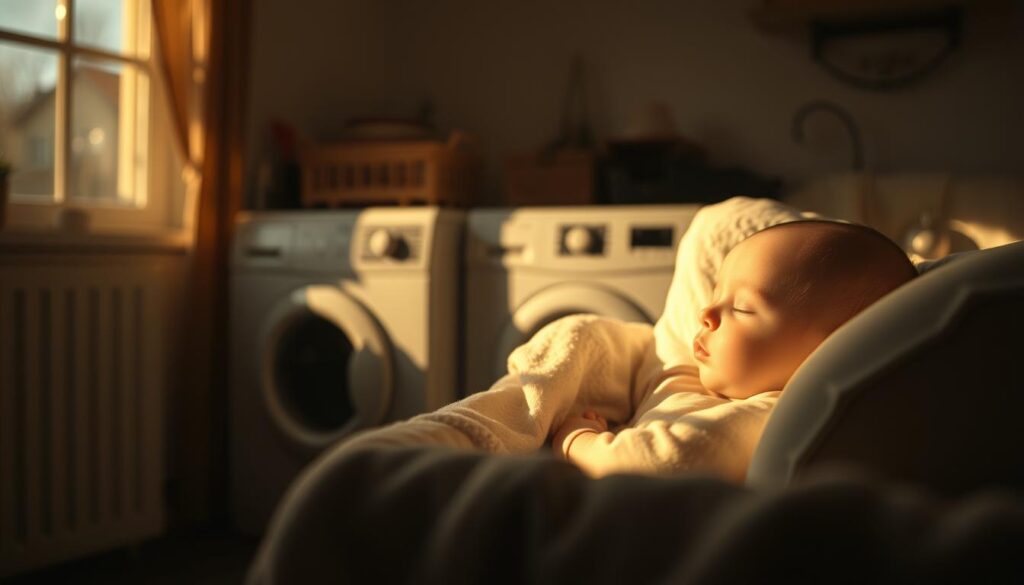
To lessen noise disruptions, get to know appliance sounds well. Try not to use loud appliances during baby naps. Watching and keeping noise levels low is crucial for good baby sleep.
Sources of Appliance Noise in Your Home
Knowing the types of appliance noise at home is key to giving your baby a calm space. Everyday items like dishwashers, washing machines, and dryers can be loud. These noises might disturb your baby’s sleep.
Dishwashers usually hum softly, but washing machines and dryers can be loud and shaky. HVAC systems can make whooshing and loud sounds. Recognizing these noises helps you understand their effect on your baby’s sleep.
| Appliance | Typical Noise Level (dB) | Potential Disruption |
|---|---|---|
| Dishwasher | 45-70 | Moderate |
| Washing Machine | 50-80 | High |
| Dryer | 50-70 | Moderate |
| HVAC System | 40-70 | Variable |
To help your baby sleep better, learn about these noise sources. This knowledge lets you create a quieter home. Making your home more peaceful ensures your infant sleeps well.
Identifying the Most Disruptive Appliances
It’s important to know which appliances disturb a baby’s sleep. Some home devices are noisy and can stop your baby from resting well. Figuring out which ones make a lot of noise helps you solve the problem.
Studies show items like microwaves, fridges, and hairdryers can mess with a baby’s sleep. Here’s how loud these items can be and how they might affect sleep:
| Appliance | Noise Level (Decibels) | Potential Disruption |
|---|---|---|
| Microwave | 60-90 dB | Can startle or wake a sleeping baby |
| Refrigerator | 40-60 dB | Continuous hum may cause background disruption |
| Hairdryer | 80-90 dB | Very loud, likely to disturb sleep immediately |
Knowing which appliances disturb babies helps you lower noise at home. Start by listing the loud devices you have. This way, you can work on making it quieter for your child’s sleep.
How Appliance Noise Affects a Baby’s Sleep Cycle
Noise significantly impacts babies’ sleep cycles. Loud household sounds may disrupt their sleep. This leads to short, interrupted sleep patterns. Babies try to move between sleep stages but get awakened. Constant noise makes it hard for them to fall back into deep sleep.
Studies show noise does more than wake infants up. It can make them stressed and more likely to fuss when awake. Being around too much noise can mess with their sleep in the long run.
It’s important to know how appliance sounds affect your baby’s rest. Keeping their sleeping area quiet helps them sleep without waking up often. This makes the night calmer for both you and your baby.
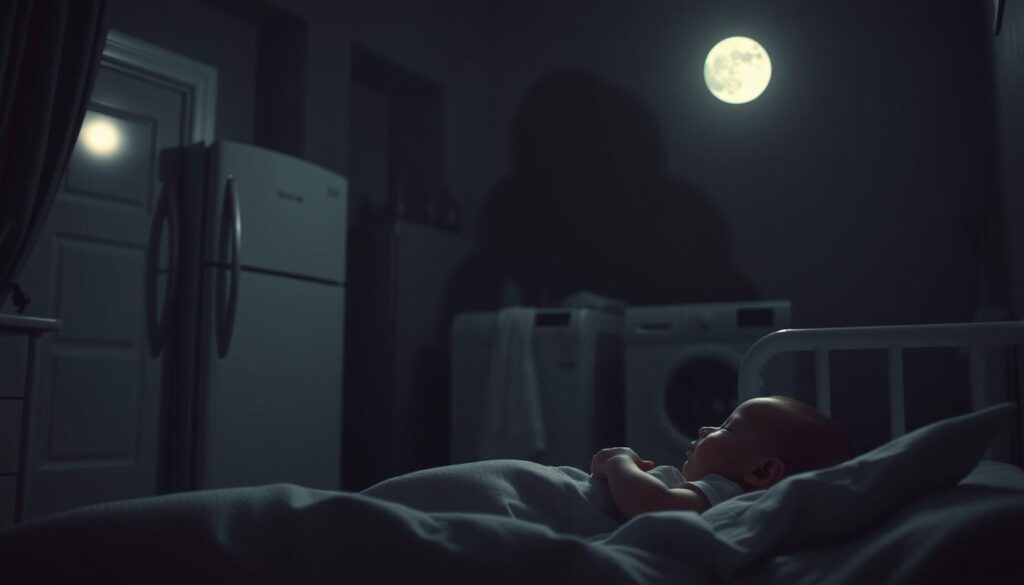
Strategies for Reducing Appliance Noise for Babies
It’s key to learn how to make appliance noise less for babies. This helps create a calm sleep space. Try out several methods that can greatly improve how well your baby sleeps. One way is to move loud appliances away from where your baby sleeps. Doing this can really cut down on sleep disruptions.
Using noise barriers is another smart move. They can block and soak up sound, making things quieter. Also, if you need to use these appliances, wearing earplugs or noise-canceling headphones helps. It keeps the noise down for you, keeping things calm around you.
Think about when you use noisy appliances, too. Running things like your dishwasher when the baby is up can keep their sleep peaceful. Also, putting in things that soak up sound, like carpets or special wall panels, helps silence unwanted noise at home.
Creating a Peaceful Sleep Environment for Your Baby
Making a calm sleep space for your baby is key for better rest. White noise machines can block out common household noises safely. These are great for keeping babies calm and can help them fall asleep more easily.
But a peaceful room isn’t just about sound. It also means keeping the room temperature steady. A constant, comfy temperature helps your baby sleep well. Also, keep the room dim to reduce distractions and make it more relaxing.
Adding soft furniture and light colors helps too. These touches make the space calming. They not only help your baby sleep better but also create a nurturing environment for them to grow. Working on the sleep area is worth it in the end.
Long-Term Effects of Appliance Noise on Infant Development
Long exposure to appliance noise can affect infant growth. Studies show it’s key to recognize how noise impacts a child’s development over time. Hearing and learning issues are big concerns, as loud noises may hurt not just hearing but also thinking and language skills.
It’s vital to protect kids from too much noise. In loud places, infants might have trouble hearing speech sounds clearly. This is important for learning to talk. Also, if noise messes with their sleep, it can slow down their learning as they get older. Paying attention to these issues helps your child grow up healthier.
| Aspect | Impact of Noise Exposure |
|---|---|
| Hearing | Increased risk of hearing impairments |
| Language Development | Delayed speech milestones |
| Cognitive Growth | Impaired learning abilities |
| Social Skills | Difficulties in communication |
Managing Household Sounds for a Calmer Baby
Household sounds matter a lot when you have a baby. Keeping things quiet helps your baby sleep better. Knowing how to manage noise can make your baby happier.
To keep your baby calm, try to keep your home quiet. Use things that block noise and set times when everyone should be extra quiet. It’s important that everyone knows to keep it down when the baby sleeps. Just telling people to speak softly or turn down the TV helps a lot.
Making sure your home is peaceful is key. Plan times for quiet each day. Choose calm activities like reading or soft play to help your baby feel relaxed. Try different ways to manage noise and see what’s best for your family.
| Sound Management Techniques | Description |
|---|---|
| Quiet Hours | Designate specific times during the day and evening for minimal noise, allowing for uninterrupted rest. |
| Soundproofing Materials | Invest in curtains, rugs, or wall panels that absorb sound, reducing noise levels in the home. |
| Family Education | Teach family members about the importance of reducing noise during your baby’s sleep schedule. |
| Calm Activities | Incorporate quiet activities, such as soft music or reading, to create a soothing atmosphere. |
Conclusion
Looking at how appliance noise affects baby sleep is crucial. It’s important to know how household sounds can mess up your baby’s sleep. Knowing this helps make a peaceful place for sleeping.
To keep your baby sleeping well, follow some good sleep safety tips. Identify which appliances are too loud and make them quieter. This improves your baby’s sleep, their health, and growth.
When thinking about handling noise, small changes matter a lot. Making your home quieter sets a loving space. This helps your baby grow well in their important early years.

